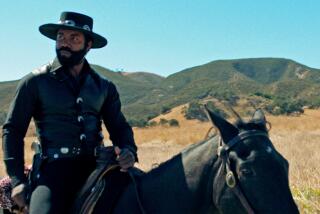Sitting atop rock’s new wave
- Share via
The White Stripes
“Elephant” (V2)
****
There’s a lot riding on this album -- for the White Stripes and for rock ‘n’ roll. As the centerpiece of a heralded new wave of bands, the Stripes have generated more respect and enthusiasm -- among critics and other musicians at least -- than any other U.S. band since Nirvana and Nine Inch Nails more than a decade ago.
Despite all the magazine covers and MTV exposure, however, neither the Stripes nor the many aligned bands, including the Strokes and the Hives, have achieved the 1 million sales level that is the entry-level mark of success for major record labels.
If “Elephant” explodes onto the charts when it is released Tuesday, a true rock revolution may be underway, because record companies will look for more bands with the classic songwriting skills and raw energy of the Stripes. And radio and TV outlets will devote more airtime to these bands rather than to the mostly hollow, anonymous outfits of recent years.
If the album doesn’t sell, many impatient label and media signal-callers may declare the movement stillborn and look elsewhere for the Next Big Thing.
The amazing thing about “Elephant” is that Jack White, the Stripes’ chief auteur, seems oblivious to all the expectations surrounding him. Rather than make a record that reaches out to the mainstream, he and his partner, drummer Meg White, continue on their own independent path.
There are a lot of reasons Jack White is exciting, but above all he’s smart. He doesn’t just sing, write and play guitar better than any other American newcomer on the scene, he also outthinks them.
Listening to “Elephant” is like playing chess with a tournament pro -- an experience so full of unexpected twists and turns that you find yourself trying to guess where he’s going, only to marvel at his choices.
The album opens and closes with dashes of humor, a quality that is all too rare in rock since the grunge and rap-rock uprisings of the ‘90s.
Two things mentioned in virtually every story about the Detroit duo are that the band’s instrumentation consists only of guitar and drums -- no bass -- and that the Whites claim to be brother and sister even though everyone suspects they were once husband and wife.
So what’s the first thing we hear on the album? A burst of bass lines so aggressive that you can picture White chuckling in the studio. (It’s actually a joke within a joke, because White generated the bass sounds with a conventional guitar.)
And at the end of the album, Stripes fans will find themselves laughing as guest vocalist Holly Golightly toys with the mystery of the Jack-Meg relationship. In a mock love song, she tells us wistfully, “Well it’s true that we love one another / I love Jack White like a little brother.”
Jack White’s musical inspiration is rooted deeply in the Delta blues of Robert Johnson -- music that is full of sexual energy, myth-making and earthy consequence. He assaults us with it in several spots in the album, including a bawdy seven-minute exercise (“Ball and Biscuit”) that is so defiantly designed that Howlin’ Wolf or Son House would have tipped his hat.
In this and other blues workouts, White wields his guitar like a saber -- probing, teasing, taunting, suddenly slashing and finally stabbing.
Rather than polish or update the sound in a high-tech studio, the White Stripes recorded the album in two weeks in a London studio whose equipment is mostly from the ‘60s. The album booklet proudly declares, “No computers were used during the writing, recording, mixing or mastering of this record.”
Besides conveying the gritty urgency of the blues, this primitive approach also adds innocence and charm to White’s more delicate moments, which range from a remake of “I Just Don’t Know What to Do With Myself,” a Burt Bacharach-Hal David song that was recorded in the ‘60s by Dionne Warwick and Dusty Springfield, to White’s own, equally tender “You’ve Got Her in Your Pocket.”
By changing from the boastful bluesman to the fragile, sometimes helpless crooner, White takes us through the extremes of human experience, helping us feel invincible at times and sharing our vulnerability at other times. Though there are sidesteps into strange territory (just what is going on between him and his mother in “The Air Near My Fingers”?), he mines real emotion in a song such as “Hypnotize,” in which he describes so wanting to be close to a woman who’s not interested in him that he phones her just so he can hear the tone on the line. He is at his most affecting when he touches on the occasional obsessiveness in us all.
*
Robert Hilburn is The Times’ pop music critic. He can be reached at robert.hilburn@latimes.com
More to Read
The biggest entertainment stories
Get our big stories about Hollywood, film, television, music, arts, culture and more right in your inbox as soon as they publish.
You may occasionally receive promotional content from the Los Angeles Times.







